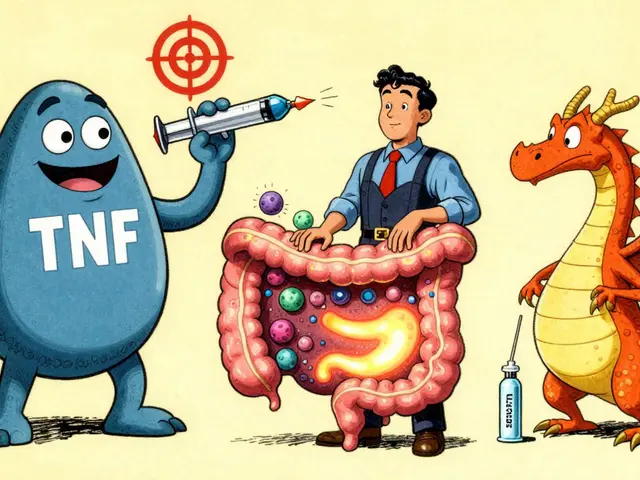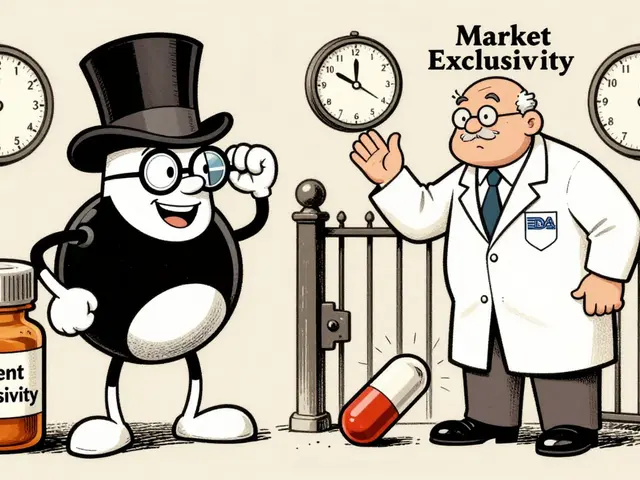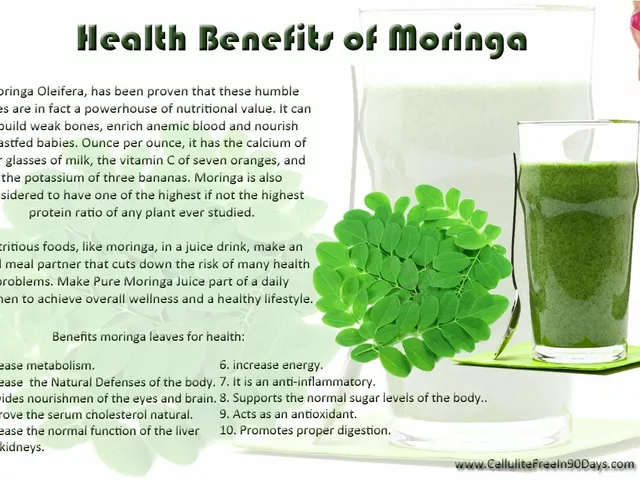Folate deficiency, often overshadowed by other nutritional deficiencies, is surrounded by myths and misconceptions. Many might find it challenging to separate fact from fiction in the sea of information available.
We'll delve into the real role of folate in the body, debunk common myths, highlight the symptoms and risk factors, and share practical tips to help you maintain healthy folate levels. Let's clear up the confusion once and for all.
- Understanding Folate and Its Importance
- Common Myths About Folate Deficiency
- Recognizing Symptoms and Risk Factors
- Practical Tips to Maintain Healthy Folate Levels
Understanding Folate and Its Importance
Folate, also known as vitamin B9, plays a critical role in maintaining overall health. It’s a water-soluble vitamin that is essential for numerous bodily functions, including DNA synthesis, repair, and methylation. When you think about folate, think about the basic building blocks of life.
This vitamin is vital for cell division and growth. This is especially important during periods of rapid growth, like pregnancy and infancy. Pregnant women are often advised to take folic acid supplements to ensure the proper development of their baby's neural tube, which later becomes the brain and spinal cord. A folate deficiency during this crucial period can lead to significant birth defects, making it imperative for expecting mothers to monitor their folate intake closely.
Apart from its importance in pregnancy, folate has roles in producing healthy red blood cells, thus preventing anemia. Anemia due to folate deficiency can result in symptoms like extreme fatigue, weakness, and pale skin. This type of anemia is often confused with iron-deficiency anemia, but they are distinctly different and require different treatments.
Where Can You Get Folate?
Folate occurs naturally in a variety of foods. Leafy greens, legumes, seeds, and liver are all high in natural folate. Here’s a quick list to guide you:
- Spinach
- Asparagus
- Brussels sprouts
- Oranges
- Beans and peas
- Fortified cereals and grains
While it's always best to get your vitamins from food, supplements are also a viable option. The synthetic form of folate is known as folic acid, which is often added to foods or taken as a pill. Folic acid is more bioavailable than the natural form found in food, meaning your body can absorb it more efficiently.
Daily Requirements and Recommendations
It's crucial to meet the daily recommended intake of folate to maintain good health. For adults, the recommended daily allowance (RDA) is 400 micrograms (mcg). Pregnant women should aim for at least 600 mcg, and breastfeeding women need about 500 mcg. Keep in mind these numbers can vary based on individual health needs and conditions.
“The importance of folate in the diet is well-supported by decades of scientific research,” according to the National Institutes of Health. “Its role in DNA synthesis and repair makes it indispensable for cellular function.”
Understanding the importance of keeping your folate levels in check is the first step toward a healthier life. Whether you're planning to start a family, already expecting, or just aiming to stay healthy, don't overlook this essential nutrient. Keep an eye on your diet, consider a supplement if necessary, and always consult with a healthcare provider to tailor these recommendations to your specific needs.

Common Myths About Folate Deficiency
Misunderstandings about folate deficiency are widespread, leading many to make incorrect assumptions about this nutrient. One common myth is that folate deficiency only affects pregnant women. While it's true that expectant mothers need more folate to prevent birth defects, anyone can suffer from a lack of this crucial vitamin. Folks of all ages, from children to seniors, may develop a deficiency, affecting their health in significant ways.
Another widely believed myth is that folate and folic acid are the same. Although related, these two forms of Vitamin B9 are not identical. Folate is the natural form found in foods like leafy greens, citrus fruits, and beans, while folic acid is the synthetic version often added to supplements and fortified foods. Both play important roles, but the body processes them differently. Folate's bioavailability is generally better from food sources than folic acid from supplements.
Some people think that folate deficiency is extremely rare and not something most need to worry about. However, statistics tell a different story. Folate deficiency affects a significant portion of the population. According to the World Health Organization, millions globally have inadequate levels of folate, particularly in regions with poor dietary habits or limited access to varied food sources. This is why it’s important to understand the evidence rather than rely on hearsay.
"Inadequate folate intake is a global concern, affecting various demographics differently. It’s vital to promote diverse dietary habits," says a report by WHO.
The belief that folate deficiency can only be addressed through supplements is another myth needing debunking. While folic acid supplements can help, especially in cases of severe deficiency, improving one's diet is often the best first step. Incorporating foods rich in folate, like asparagus, broccoli, and lentils, can naturally boost your levels.
Another misconception is that folate deficiency only leads to anemia. Although anemia is a common symptom, it’s far from the only issue that may arise. Folate deficiency can result in neurological problems, such as cognitive impairment or mood disorders, due to its role in the production of neurotransmitters. Furthermore, it can also increase the risk of cardiovascular diseases due to elevated homocysteine levels.
Lastly, many assume that multivitamins contain sufficient folate. Unfortunately, this is not always the case. The folate content in multivitamins can vary widely, and not all supplements are created equal. It's essential to read labels carefully and consult healthcare providers to ensure you're meeting your needs. A registered dietitian or nutritionist can help create a plan tailored to your individual requirements.

Recognizing Symptoms and Risk Factors
Identifying the symptoms of folate deficiency can be tricky, as they often overlap with other health issues. One of the most common symptoms is fatigue. If you're feeling more tired than usual, even with a good night's sleep, it might be your body signaling a problem with your folate levels. Folate plays a crucial role in producing red blood cells, which are vital for transporting oxygen throughout the body. Without adequate oxygen, tiredness and weakness naturally follow.
Another symptom to be aware of is mouth sores. People often overlook these painful little lesions, but they can be an indicator of folate deficiency. Folate is important for cell division and tissue repair, so a lack of it can hinder the body's ability to maintain healthy mucous membranes.
Digestive issues such as diarrhea and loss of appetite can also be symptoms of a folate deficiency. Your gastrointestinal system requires folate to function properly. When folate stores are low, you might find yourself losing weight without trying, or struggling with regular digestion.
People with a deficiency might also experience mental slowness or mood changes. This symptom is particularly concerning because it mimics conditions like depression or cognitive decline, leading to misdiagnosis. Folate is essential for synthesizing neurotransmitters, the brain's chemical messengers, which affect mood and mental clarity.
Pregnant women or those planning to become pregnant should be particularly vigilant. Folate is crucial for fetal development, and a deficiency can lead to serious birth defects, particularly neural tube defects. Pregnant women need at least 600 micrograms of folate per day, which is why doctors often recommend supplements during pregnancy.
Who is at Risk?
Certain groups are more susceptible to folate deficiency. One such group includes individuals with poor diets. Processed foods and overcooked vegetables can devoid your diet of much-needed folate. It’s always a good idea to incorporate fresh, leafy greens, legumes, and fortified grains into your diet to keep those levels in check.
Another high-risk group is people with medical conditions affecting the absorption of nutrients. Conditions like celiac disease, inflammatory bowel disease, and some types of cancer can interfere with the body's ability to absorb folate efficiently. Regular check-ups and blood tests can help monitor folate levels for those suffering from these conditions.
Medications are another factor. Certain drugs, particularly those used for cancer treatment or seizure control, can affect how well your body absorbs or utilizes folate. If you're on a long-term medication regimen, talk to your doctor about your folate levels.
Lastly, individuals with excessive alcohol intake are at risk. Alcohol interferes with the absorption of many nutrients, including folate. It also causes the kidneys to excrete more folate, making it challenging to maintain adequate levels. Reducing alcohol consumption is often an essential step in correcting a deficiency.
"Awareness is the first step. By understanding the risks and recognizing the symptoms, you can take proactive steps to keep your folate levels in a healthy range," says Dr. Claire Stevens, a renowned nutritionist.

Practical Tips to Maintain Healthy Folate Levels
Maintaining healthy folate levels might seem like a daunting task, but with the right knowledge and habits, it can be done easily. One of the most effective ways to ensure you're getting enough folate is through your diet. Incorporating a variety of folate-rich foods into your meals is key. Foods like leafy green vegetables, legumes, nuts, and seeds are excellent sources of natural folate.
Another important tip is to be aware of cooking methods. Overcooking vegetables can lead to a significant loss of folate. Steaming or consuming them raw helps preserve their nutritional value. It’s also helpful to understand that liver, although not commonly consumed, is one of the richest sources of folate and can be included in moderation.
For those who may have dietary restrictions or find it difficult to get enough folate through food alone, considering a supplement might be beneficial. Pregnant women and individuals with certain medical conditions often need higher folate levels and should consult with a healthcare provider to determine the best folate supplement. Always choose supplements with the active form, methylfolate, for better absorption and efficacy.
It’s interesting to note that some breakfast cereals and bread products are fortified with folic acid, the synthetic form of folate. Checking food labels can help identify fortified products that can contribute to your daily folate intake. Including these in your diet can be a simple way to boost folate levels without much effort.
Staying hydrated and supporting gut health are also crucial for folate absorption. Folate is water-soluble, so drinking plenty of water ensures it reaches your cells effectively. Probiotics and a diet rich in fiber support a healthy digestive system, which in turn, aids in the better absorption of nutrients, including folate.
Lastly, regular check-ups with your healthcare provider can help monitor your folate levels. Blood tests can provide insights and help identify any deficiencies early on, allowing for timely dietary adjustments or supplementation.
"Proper folate levels are essential for everyone, but especially important for pregnant women to prevent neural tube defects in their babies," advises Dr. Karen Swanson, a noted nutrition expert.
With these practical tips, you can maintain healthy folate levels and support overall well-being. Always remember, balanced nutrition and mindful eating habits play a crucial role in maintaining not just folate, but all essential vitamins and minerals.










Oh sure, because we all magically remember to sprinkle kale on our pizza 🍕🌿, right? Folate isn’t just a pregnancy perk, it’s the silent engine that keeps your red blood cells from turning into lazy couch potatoes. If you think you’re safe because you munch on a steak, think again – meat has almost no folate. So, next time you’re bragging about your protein shake, remember that a handful of spinach could actually save you from that pesky fatigue. 😏
Enjoy the irony!
It’s disheartening to see how many ignore the simple responsibility of maintaining adequate folate levels. One could argue that neglecting such a basic nutritional need borders on selfishness, especially when it jeopardizes public health. The moral imperative is clear: prioritize a balanced diet, or face the consequences of preventable anemia and cognitive decline.
Frankly, the British NHS guidelines have been ahead of the curve for years, recommending 400 µg daily for adults and 600 µg for pregnant folks. Most foreigners underestimate how crucial folate is for DNA repair, yet they still eat processed junk. If you’re not getting enough leafy greens, you’re simply not living up to the standards we set.
Absolutely, it’s a team effort-your plate, your doctor, and even your grocery store can work together to keep folate levels optimal. While we can’t force anyone to eat spinach, we can share recipes that make it tasty and remind each other about supplement timing. Let’s keep the conversation going and help one another stay healthy.
Different cultures have long embraced folate‑rich foods, from fermented soy in East Asia to lentil stews in the Mediterranean. Incorporating these traditional dishes can naturally boost intake without relying on synthetic supplements.
Dear readers, it is with great plisare that I encourage you to consider folate as an essential component of your daily regimen. Regular consumption of leafy vegetables, legumes, and fortified grains can markedly reduce the risk of macrocytic anemia. Moreover, maintaining adequate folate contributes to neurocognitive health, an aspect often overlooked in mainstream discourse. I sincerely hope you embrace these recommendations, and may your health flourish.
Many claim they’re doing everything right, yet their diet lacks the fundamental nutrients required for efficient hematopoiesis. It’s time to stop the self‑deception and acknowledge that folate deficiency is a real, measurable issue, not a myth propagated by supplement sales.
Imagine waking up feeling as if your brain is fogged by a thick, unrelenting mist-only to discover a simple vitamin could lift that veil! The power of folate to brighten both mind and spirit is nothing short of miraculous, and embracing it can transform your daily life into a vibrant adventure.
Folate is important for healthy blood and brain. Eating greens and beans helps a lot.
Yo you got this keep adding spinach kale and beans to meals 🌱 it’ll boost your energy levels and mood 😃 keep it up
Folate, also known as vitamin B9, is indispensable for the synthesis of nucleic acids and the methylation processes that regulate gene expression.
The absence of sufficient folate impairs DNA replication, leading to chromosomal abnormalities and increased cancer risk.
The most common clinical manifestation of folate deficiency is megaloblastic anemia, characterized by enlarged, immature red blood cells that fail to transport oxygen efficiently.
Patients often present with profound fatigue, pallor, and shortness of breath, symptoms frequently misattributed to iron deficiency.
Beyond hematologic effects, low folate levels have been linked to neuropsychiatric disorders such as depression, cognitive decline, and even peripheral neuropathy.
Homocysteine, an amino acid associated with cardiovascular disease, accumulates when folate‑dependent pathways are disrupted, underscoring the vitamin’s cardioprotective role.
Dietary sources rich in natural folate include dark leafy greens, legumes, citrus fruits, and fortified grain products, each offering varying bioavailability.
Cooking methods dramatically influence folate retention; steaming vegetables preserves up to 90% of the nutrient, whereas boiling can leach up to 50% into the water.
For individuals with malabsorption syndromes, such as celiac disease or inflammatory bowel disease, oral supplementation with methylated folate forms may be necessary.
Pregnant women require higher folate intake-at least 600 µg daily-to prevent neural tube defects, a requirement recognized by health agencies worldwide.
Regular monitoring of serum folate and red blood cell folate concentrations can guide clinicians in adjusting dietary recommendations or supplement dosages.
It is prudent to assess potential drug interactions, as certain anticonvulsants and methotrexate can exacerbate folate depletion.
Public health initiatives that fortify staple foods with folic acid have successfully reduced the incidence of birth defects in many countries.
Nevertheless, reliance on synthetic folic acid alone may not address individual variations in metabolism, making natural food sources essential.
Ultimately, a balanced approach that combines diverse folate‑rich foods with appropriate supplementation, when needed, offers the most comprehensive strategy for maintaining optimal health.
Foliate your diet now, and stop making excuses-your body isn’t a trash can for junk food! 😉 Incorporate a handful of spinach, a cup of lentils, or a fortified cereal each day, and you’ll notice the difference in energy and focus. If you need guidance, I’m happy to point you toward reputable sources, but the ball’s in your court.
Keep up the good work! Remember to check your folate intake regularly and adjust your meals as needed. You’ve got this.
Observing dietary trends over the past decade reveals a troubling decline in whole‑food consumption, especially among younger adults.
This shift directly correlates with increased reports of folate insufficiency, which many dismiss as a niche concern.
The reality is that even modest reductions in leafy vegetable intake can drop serum folate levels by a measurable margin.
Moreover, the modern habit of over‑cooking vegetables erodes the very nutrients we strive to preserve.
Public health messages often focus on calories, neglecting micronutrient density, which leaves the public uninformed about essential vitamins like B9.
When clinicians order a complete blood count, they sometimes overlook checking red blood cell folate, missing an early warning sign.
Integrating short, educational snippets about folate into school curricula could empower the next generation to make smarter food choices.
Additionally, food manufacturers should be encouraged to fortify more diverse products beyond breakfast cereals.
Community gardens and urban farms present a practical solution, providing fresh, folate‑rich produce to underserved neighborhoods.
In my experience, patients who adopt even a single serving of raw spinach daily report less fatigue within weeks.
The biochemical mechanisms are clear: sufficient folate supports efficient methylation, which in turn maintains neuronal health.
Ultimately, a collective effort-from individual plate choices to policy‑level interventions-will close the folate gap and improve public health outcomes.
Life is like a salad, you need the greens of knowledge to keep the mind from wilting. When we ignore folate we are basically missing the dressing of health. Think about it and maybe add some beans next time you cook.
Our nation must prioritize folate fortification; health is a patriotic duty.
Well, this could've been shorter.